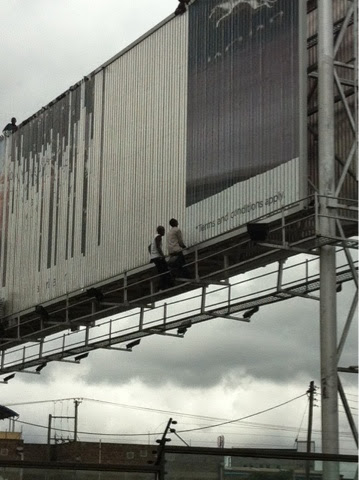On our walk to the building, we received friendly waves from some guys putting up a new billboard, piece by piece.
Today, we are dressed particularly formally given the nature of some our meetings (and cocktail event later tonight).
While sitting in this lovely classroom, we felt we were right back at SBS getting ready for class to begin.
Bridge teachers use a detailed curriculum script in schools that are simply built and located directly in slums. Bridge also does the construction themselves due to limitations so they are quite vertically integrated. Some stats on typical clients' households:
57% self-employed
95% mobile phone owners
50-50 male femal classroom breakdown
79% urban
Ages 3-12
Avg hh income: $1.23 per person per day
259 active academies in Kenya
Looking to expand to Nigeria and Uganda
The school building
We certainly had interesting discussions after the visit- and apparently Bridge is known to be polarizing. Education purists and others are concerned with a highly-structured nearly-scripted approach to teaching, others were concerned with the quality of the buildings and lack of lighting, particularly in contrast to the office itself which led to debates about for-profit education initiatives. Personally to be sold, I'd like to see more details on the financial model of the business and also the financial philosophy (would they subsidize tuition or not, are buildings cheaply-made to ensure affordability and access, who are the investors and what returns are they asking for, who is on the board, how is impact measured, etc). I just need a little more confidence in their social mission but I am impressed with what I saw of the curriculum and the degree of focus in the classrooms we observed. Anyways, more discussion on these questions warrant another blog entry but for now I will move on with the update.Next we went to Safaricom, the largest telecoms company in Kenya (and is a Kenyan business) and they provide mobile money transfer services that are used by 80% of the entire Kenyan aut population - called M-PESA. M-PESA saves people tremendous amounts of time (and therefore money), and allows for financial inclusion on a massive scale allowing unbankable people access to insurance, MFI loans, cheap money transfer services, etc. M-PESA outpaces competition significantly and MPESA stations are as ubiquitous as CocaCola.
Some stats:
18.2m users
70k merchants using it for business to customer payment transfers, salary payment distribution, etc
Over 6m transactions daily
Without MPESA, only 23% if the population, rather than 80%, would be included in the formal economy
Used by MFIs, social enterprises to facilitate ease of money transfer, reducing risk of transferring physical cash






No comments:
Post a Comment